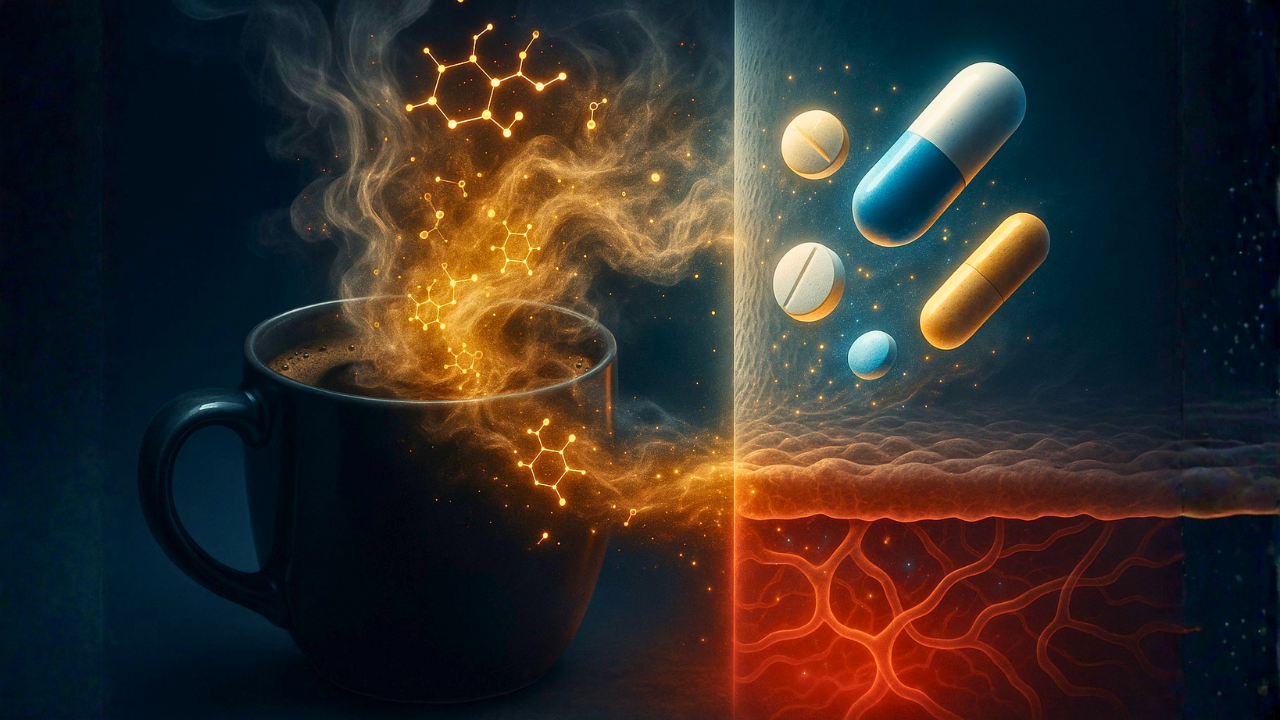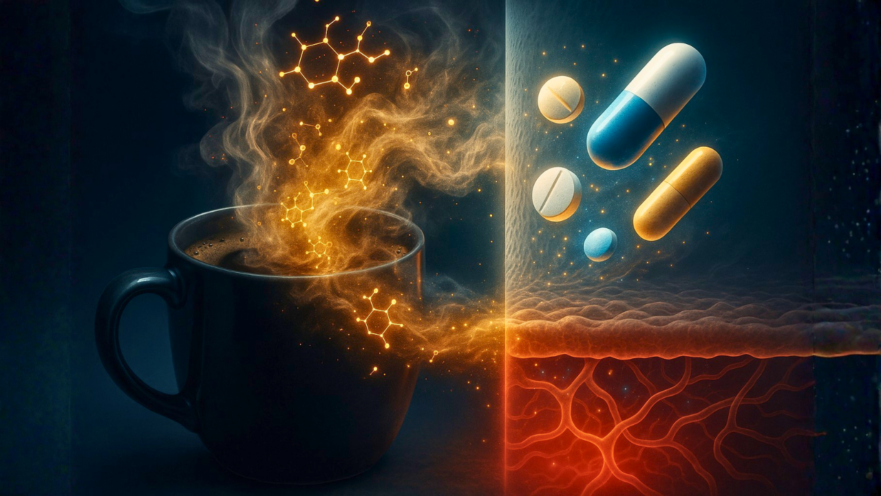
Do you start your day with a cup of coffee and a handful of medications? If so, you might want to be extra cautious. Coffee—a morning staple for many—can interact with a surprising number of prescription medicines, affecting their effectiveness and your overall health.
It’s easy to see coffee as just a harmless pick-me-up, but the truth is much more complex. Coffee contains caffeine, a powerful stimulant that can change how your body absorbs or processes certain medications. This means that, depending on what prescriptions you take, your daily cup may do more than just energize you; it might actually make your medication less effective or even intensify its side effects.
Whether you rely on blood pressure pills, antidepressants, or thyroid medication, you should know which meds don’t jive with coffee. Below, we’ll break down the most important drug-coffee interactions, why they matter, and how you can keep yourself safe while still enjoying your brew.
Key Takeaways
- Coffee can interfere with the way your body absorbs or reacts to many common medications, including antidepressants, anticoagulants, and thyroid drugs.
- For some medicines, caffeine increases the risk of side effects like restlessness, heart palpitations, or even reduces drug effectiveness.
- Always check with your healthcare provider about coffee and medication timing if you’re unsure—spreading them out might be safer!
1. Anticoagulants (Blood Thinners)
Anticoagulants, such as warfarin (Jantoven) and heparin, are crucial for people at risk of blood clots. If you regularly consume coffee while on these medications, research has found that caffeine can increase the concentration of blood thinners in your bloodstream. This may boost the medication’s effectiveness—but not in a good way. You could be at greater risk of bleeding, a serious side effect that can land you in the hospital.
2. Antidepressants
Antidepressants help manage conditions like depression and anxiety, but coffee could reduce their effectiveness or intensify side effects, depending on the drug. For medications like amitriptyline, fluvoxamine (Luvox), fluoxetine (Prozac), escitalopram (Lexapro), imipramine, and paroxetine (Paxil), caffeine can either lower or boost absorption. For instance, taking Luvox with coffee can increase side effects, such as sleep problems and a racing heart. Always confirm the safest routine with your doctor.
3. Antipsychotics
Antipsychotic drugs—including aripiprazole (Abilify), prochlorperazine (Compro), haloperidol (Haldol), and pimozide (Orap)—help treat schizophrenia and severe mood disorders. Coffee may cause your body to absorb less of these medications, which could decrease their effectiveness. While it’s not usually dangerous to have coffee while on these meds, it’s best to space out your doses and not take both together.
4. Asthma Medications
Bronchodilators are essential for keeping airways open in asthma sufferers. However, both bronchodilators and caffeine are stimulants and can lead to side effects like restlessness, headaches, and a rapid heart rate. Coffee can make these issues worse, and also reduce the amount of medication your lungs absorb. To stay safe, avoid drinking coffee close to your asthma medicine dose.
5. Blood Pressure Medication
High blood pressure is very common, and drugs like propranolol (Inderal) and metoprolol (Lopressor) control your blood pressure and heart rate. Caffeine can decrease the body’s ability to absorb these medications, meaning your blood pressure could stay higher, despite your medicine. To get the full effect, take your pills and coffee at different times of day.
6. Cholinesterase Inhibitors
Medications for Alzheimer’s disease and dementia—including donepezil (Aricept)—work on important brain chemicals. Unfortunately, caffeine reduces how much medication actually reaches your brain, making your medicine less effective. Maximum benefit comes from avoiding coffee around the time you take these drugs.
7. Cold and Allergy Medications
Medications containing pseudoephedrine, such as Sudafed, or allergy drugs like fexofenadine (Allegra), are stimulants. Combining them with coffee can double the side effects: trouble sleeping, jitteriness, a racing heart, and increased anxiety. It’s best to skip the coffee when you have to take these meds.
8. Diabetes Medication
If you have diabetes, watch your caffeine intake. Research shows caffeine can raise blood sugar and insulin levels, making it harder to control diabetes. If you notice your sugar levels swinging, your morning coffee could be the culprit.
9. Methotrexate
Methotrexate, commonly used as a chemotherapy drug or for autoimmune conditions, is processed differently in the body when caffeine is present. Coffee can increase the amount of methotrexate in your bloodstream, possibly raising toxicity risk. Even moderate caffeine may make side effects worse—ask your healthcare provider for advice.
10. Osteoporosis Medication
Medicines like ibandronate (Boniva) and risedronate (Actonel) help protect your bones, but caffeine can hamper how much your body absorbs. Most doctors recommend taking these pills with plain water—wait at least 30 to 60 minutes before that first cup of coffee to keep your bones strong.
11. Quinolone Antibiotics
Antibiotics in the quinolone family, such as ciprofloxacin (Cipro), treat tough bacterial infections. If you take these with coffee, the two can interact to exaggerate caffeine’s side effects—think anxiety, palpitations, and insomnia. Until your antibiotic is finished, steer clear of your morning brew.
12. Thyroid Medications
Levothyroxine (Synthroid), a common thyroid hormone replacement, can lose up to 50% of its effectiveness when taken with coffee. That defeats the purpose of your pill! Always take thyroid medication with water, and wait at least 30-60 minutes before enjoying coffee.
Speaking With a Healthcare Provider
If any of your prescriptions are on this list, talk with your doctor or pharmacist. They can advise you about whether you need to stop drinking coffee, delay your caffeine habit, or just change the timing of your pills. Never make changes to your medication schedule without professional advice—it’s your health at stake!
Who Should Avoid Coffee?
There are certain people who should avoid coffee altogether, even if they aren’t on any medications:
- Children and Adolescents: Caffeine can cause sleep problems, anxiety, and palpitations.
- Pregnant People: High coffee intake may increase the risk of preterm birth, miscarriage, and other side effects; limit to less than 200 mg per day (about one cup).
- People with Anxiety: Caffeine often worsens anxiety and disrupts sleep.
- People at High Risk for Heart Disease: More than six cups per day may increase heart disease risk, though studies are ongoing.
Final Thoughts
Coffee isn’t just a drink—it’s chemistry in a cup! It plays a role not just in waking you up, but also in how well your medications work. If you’re ever uncertain, don’t leave it to chance: ask your healthcare provider how to safely time your coffee and meds for maximum benefit and minimal risk. Remember, when it comes to your health, being informed is always the best choice.
Sources
- Nehlig, A., Daval, J. L., & Debry, G. (1992). Caffeine and the central nervous system: mechanisms of action, biochemical, metabolic and psychostimulant effects. Brain Research Reviews, 17(2), 139-170. https://doi.org/10.1016/0165-0173(92)90012-b
- Institute for Quality and Efficiency in Health Care (IQWiG). (2022). Drug interactions: Overview. https://www.ncbi.nlm.nih.gov/books/NBK554606/
- Moltó, J., Valle, M., Miranda, C., et al. (2021). Drug-caffeine interactions: clinical relevance and underlying mechanisms. British Journal of Clinical Pharmacology, 87(7), 2530-2545. https://doi.org/10.1111/bcp.14658
- National Institutes of Health. (2022). Caffeine: MedlinePlus Supplements. https://medlineplus.gov/druginfo/natural/979.html
- U.S. Food and Drug Administration. (2020). The Buzz on Caffeine. https://www.fda.gov/consumers/consumer-updates/buzz-caffeine-how-much-too-much

